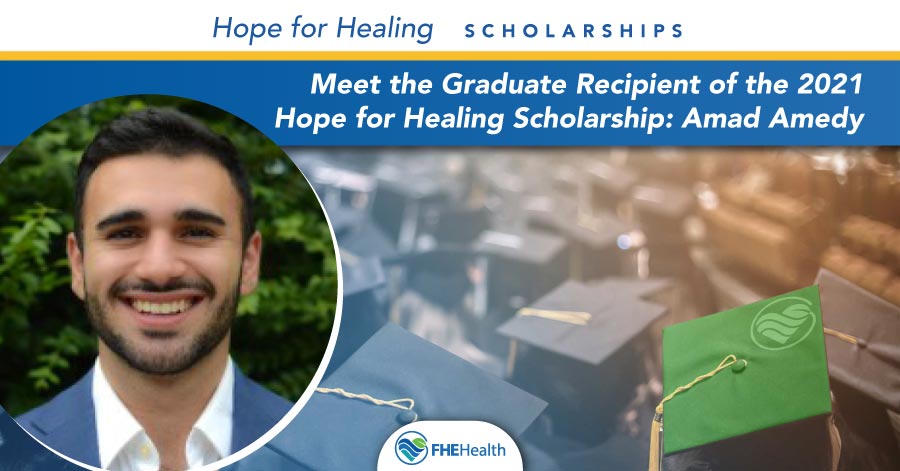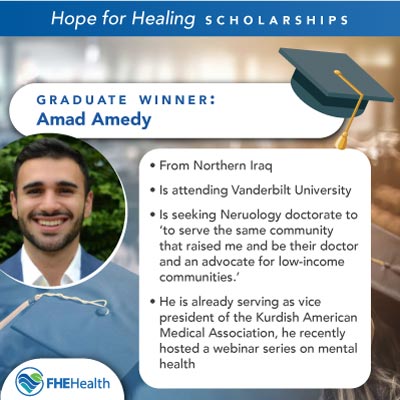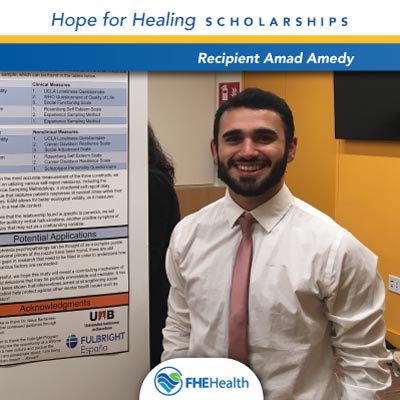
Each year FHE Health awards two outstanding individuals with a $5000 scholarship to help further their education in the field of addiction, mental/behavioral health and/or psychiatry. In this first of two blogs spotlighting this year’s winners, you’ll meet Amad Amedy, the graduate-level recipient of the 2021 Hope for Healing Scholarship. Catch his moving story below….
24-year-old Amad Amedy began his life on the run. After Saddam Hussein began a campaign to exterminate Kurds in Northern Iraq, Amedy’s parents and three older siblings fled their home in 1996. Amedy was born in a way station in Guam. He was a newborn when his family came to the U.S. as refugees and were settled in Fargo, North Dakota.
The Link Between Community and Resilience
 Amedy’s family eventually moved to Nashville, Tennessee. The warmer weather seemed more like home, and the Amedys were glad to find and belong to a supportive community of fellow Kurds.
Amedy’s family eventually moved to Nashville, Tennessee. The warmer weather seemed more like home, and the Amedys were glad to find and belong to a supportive community of fellow Kurds.
“Two things about the Kurds are their unwavering sense of community and their resilience,” Amedy said in a recent interview. He gave the example of his Kurdish neighbors, who took him in as one of their own when his parents, who could not afford childcare, were at work. Support like that from his community helped Amedy survive and even thrive, despite the poverty and hardships of refugee life.
“That’s why I went into medicine,” Amedy said. “I wanted to give back to my community there.”
Other People in the Community Who Were Influential for Amedy
There were others who played an important influence, too, according to Amedy:
“Growing up, my family couldn’t afford soccer leagues. One local soccer coach, who regularly saw my friends and me play soccer in the street, recognized our passion for the sport. He then invested his own time and money into creating a team to provide us with the opportunity to compete. For the next several years, he provided rides to and from all practices and games, never asking for a cent.”
There was also the college counselor at Amedy’s high school: “On her own dime she stayed after school and helped me apply to college.”
Amedy would go on to attend Wesleyan University on a full scholarship. (The Connecticut-based school is among the top 20 liberal arts colleges in the nation.)
Parents Whose Courage and Grit Were an Inspiration
 Amedy’s parents, who “literally dodged bombs,” are his biggest inspiration. “My parents sacrificed so much.”
Amedy’s parents, who “literally dodged bombs,” are his biggest inspiration. “My parents sacrificed so much.”
In Iraq, Amedy’s father was held in high regard as an architect. In the U.S., the language gap and different educational requirements would oblige him to find a new livelihood: managing E Milano’s Pizzeria, the family’s new business.
When 9/11 happened, it became harder to live in the U.S. as a Muslim family from the Middle East. Amedy’s father went back to Iraq to serve as a translator alongside U.S. troops. With Dad overseas in a war zone, that had to exert some level of strain on the family—what was it like?
“My dad was in a lot of combat and in pretty dangerous areas as a translator … My mom did a great job of concealing [the stress],” Amedy said. “I was really young and just know from my parents’ stories that my dad had done that for several years and came back to the U.S. once we felt more financially stable.”
Amedy credits his mother for being an anchor during this time.
Lessons in Survival and Working at the Family Pizzeria
 Looking back, Amedy said, “Like many other immigrants, we were surviving paycheck to paycheck.” They also had to make do with “poor education and limited access to affordable healthcare.”
Looking back, Amedy said, “Like many other immigrants, we were surviving paycheck to paycheck.” They also had to make do with “poor education and limited access to affordable healthcare.”
“Survival” meant pitching in behind the counter at the family’s pizzeria. At age 11 or 12, Amedy “was thrown into work the minute I could stand over a countertop,” and, “by the time I was seventeen, I managed the pizzeria full-time while juggling school, sports and extracurriculars.”
When “a lot of families are so busy surviving, they don’t have time to focus on the inconveniences to their mental health.” Amedy thinks “that can offer a protective layer, because when you’re focusing on surviving, you almost are more apt to focus on what you have and are thankful for.”
How to Help People with Severe Mental Illnesses
Amedy arrived at Wesleyan College motivated to pursue medicine and address the health disparities facing immigrant communities. Later, a course in Behavioral Neurobiology in his junior year ignited an interest in psychiatry:
“In that course I remember being so fascinated by how much we don’t know about the brain. If you think about it, nowadays you have people who can do incredibly detailed cardiac surgeries, and then in psychiatry, you have people come in and you give them medication but don’t really know all that’s going on in their brain.”
When a professor shared his research on schizophrenia, “I remember in my junior year thinking, ‘there’s no hope given the seriousness of these conditions,’ and I wanted to investigate and research whether there is a cure.”
 “I did research and realized how much is left to be discovered about the actual molecular biology of the brain.” In other words, “there’s a lot more we can do for [people with severe mental illness],” given how much remains to be understood.
“I did research and realized how much is left to be discovered about the actual molecular biology of the brain.” In other words, “there’s a lot more we can do for [people with severe mental illness],” given how much remains to be understood.
Amedy began working at a clinical research lab on campus, where people with severe mental illness, many of them homeless, went for treatment. Meanwhile, he was also conducting research and statistical analysis to better understand psychosis, a feature of severe mental illness. He shared some of these findings in his personal essay:
“When learning about psychiatric diseases in classrooms, we are often shown severe cases with little exposure to the milder forms of the illness. Even in literature, much of the focus is on widespread identification and diagnosis of diseases. Contrastingly, my interactions with patients revealed that psychosis lies on a broad spectrum, and that when given a label, they often responded more poorly by playing into their ‘sick role.'”
“I decided I wanted to do more research,” Amedy said. With the help of a Fulbright Scholarship, he went to Spain to further investigate psychosis and “the variety of factors that influenced psychosis.”
Amedy made another discovery while conducting research. He found that he preferred working with patients—the medical care side, as opposed to the scientific research side.
Why Vanderbilt University for Medical School?
With this confirmation that medical school was the right path, Amedy will be enrolling at Vanderbilt University Medical School, where he hopes to specialize in neuropsychiatry. Why Vanderbilt?
Amedy wants “to serve the same community that raised me and be their doctor and an advocate for low-income communities.” He added that “the largest Kurdish community is in Nashville, but there is a disproportionately lower level of doctors; so, I knew I could use my academic background to become a doctor and get involved with community initiatives there.”
Some of that work Amedy is already doing. As the vice president of the Kurdish American Medical Association, he recently hosted a webinar series on mental health. He has also written op-eds in his state’s newspaper, to advocate for more resources in schools and the community.
In the long term, Amedy wants to address the mental health issues and disparities that affect immigrant communities like his own, by being a doctor, leader and a voice for change. By reducing the burden of debt from medical school, the Hope for Healing Scholarship makes this vision more achievable.






